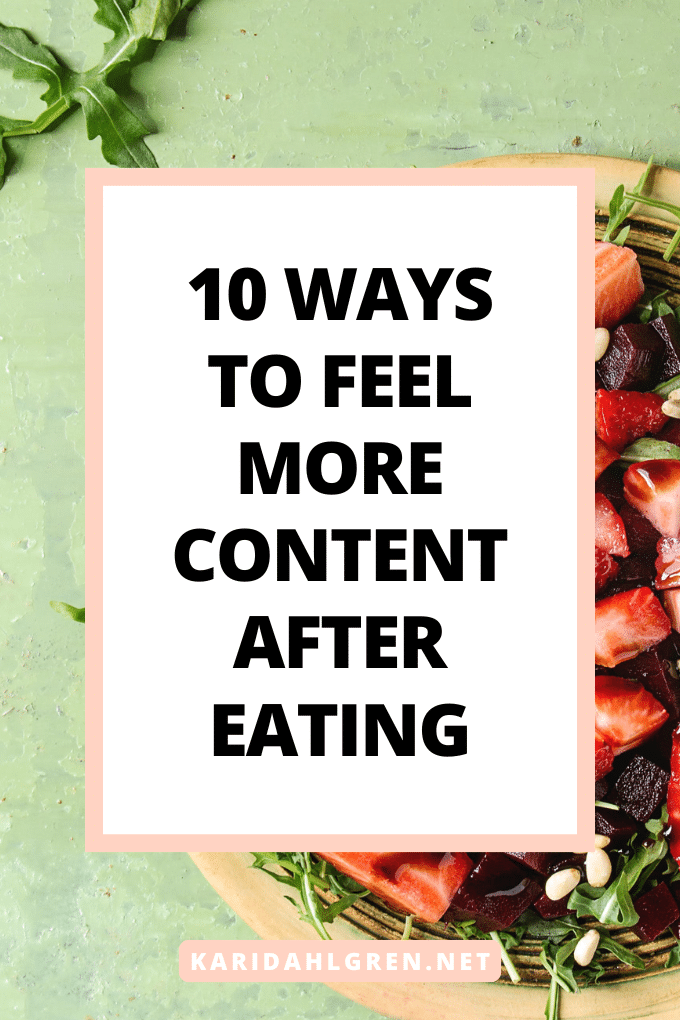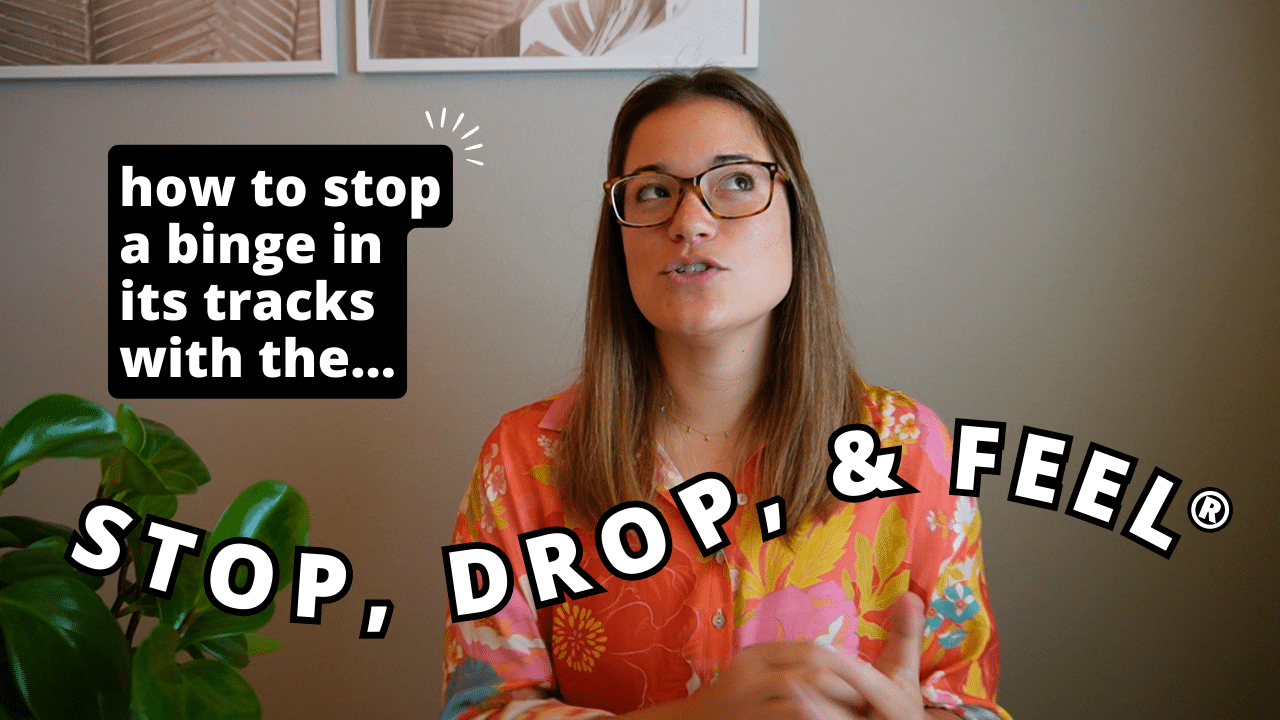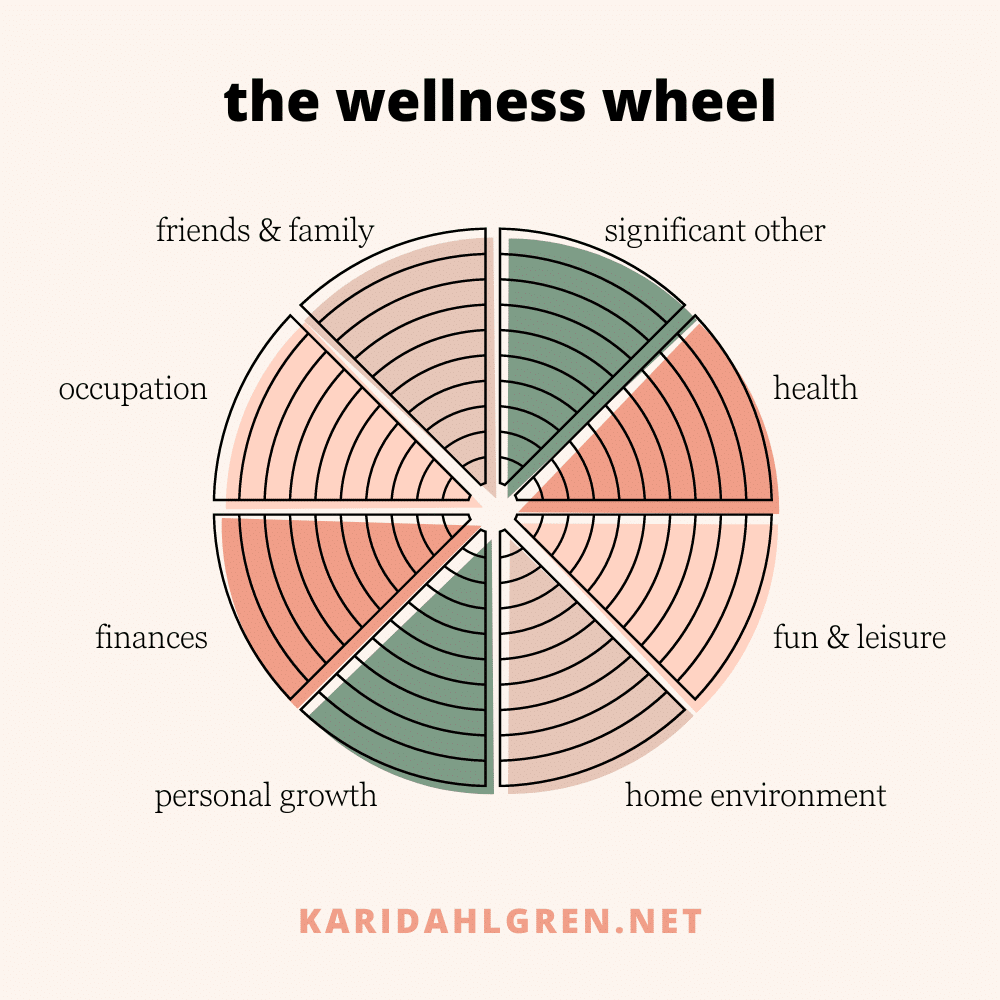
You were born knowing how to be content once you’re full. However, as diet culture began to grow louder—with its incessant ‘eat this, not that’ mentality—you may have lost touch with this innate skill.
Relearning how to be content once you’re full is about more than just the food on your plate. It’s about the emotional and mental aspects of eating too. As an eating psychology coach, I’ve seen firsthand how addressing the deeper issues around food can transform the way you eat and how you feel afterward.
In this article, we’ll explore steps to build a greater sense of contentment after eating—in ways that are backed by clinical evidence. To get there, we need to first back up and understand the similarities and differences between fullness and contentment.
Understanding Fullness and Contentment
Fullness, or satiety, refers to a state of being physically full after eating. It is the body’s natural response to the intake of food, signaling that enough nutrients have been consumed to meet its immediate energy and nutritional needs.
Physical satiety is influenced by hormones like ghrelin, which controls hunger, and leptin, which regulates fullness. These hormones communicate with the brain to tell you when you need food and when to stop eating.
Beyond the physical sensation of fullness is contentment, which delves into the emotional and mental realms. Being content after eating means feeling satisfied and at peace with your meal choices, free from the urge to continue eating in search of what was missing.
If you’ve ever felt physically full but unsatisfied after eating, it’s likely because your meal was missing an element that contributes to contentment and completeness.
How to Be Content Once You’re Full: Evidence-Based Steps
To help you reconnect with your ability to feel content after eating, I’ve compiled a series of evidence-based steps. These practical tips will guide you through the physical and emotional aspects of eating, ensuring that you walk away from each meal feeling truly content and at peace.
Here are some steps for relearning how to be content once you’re full, all backed by clinical research:
1. Eat Foods that You Genuinely Enjoy
Short story: Skipping your favorite foods makes it tough to feel content once you’re full.
Let’s say that you love carb-rich foods like pasta and sandwiches. If you’re on a low-carb diet, that means refraining from eating your favorite foods, which can cause feelings of deprivation. Even if you eat until you’re physically full, a meal that fails to include satisfying foods can leave you feeling less than content.
Therefore, one of the most important steps for feeling more content once you’re full is to eat foods that genuinely satisfy you mentally and emotionally. Even if you restrict your diet with intentions of healthier eating habits, you might actually make better food choices when you focus on enjoyment over restriction.
Research on overeating and self-regulation has revealed two distinct types of eating pleasures: visceral and “Epicurean.” Visceral eating pleasure is driven by short-term impulses, such as hunger, external cues, or emotional urges. This type of pleasure is often fleeting and can lead to overeating.
In contrast, Epicurean eating pleasure is derived from the aesthetic appreciation of food’s sensory and symbolic value. According to a study published in the journal Appetites, Epicurean eating pleasure is linked to higher well-being, a preference for smaller portions, and is not associated with higher BMI.[1]
Furthermore, a scoping review published in the journal PLoS (Public Library of Science) One found that incorporating enjoyable food experiences into your diet is associated with healthier eating habits.[2] Therefore, if you want to feel content once you’re full, focus on creating enjoyable eating experiences.
2. Enjoy Food in Good Company
Short story: If you're a social person, you might feel more content after a social meal.
Have you ever heard the saying, “eat to live, don’t live to eat”? This pop culture saying has created a stigma around enjoying your food, as if it’s a want, not a need. Yet, plenty of clinical literature shows that eating pleasure is an important aspect of eating, and it’s necessary to feel content once you’re full.
For instance, a study published in Annals of Nutrition & Metabolism shows that food has a positive impact on well-being not just because of what we eat but how we consume it and the social factors related to eating.[3] For example, enjoying meals with family and friends can contribute to a sense of connection and happiness, further enhancing your overall contentment.
While enjoying meals in good company is a wonderful way to feel more content once you’re full, it’s also important to recognize that not every meal needs to be a social event. Find a balance between social eating and eating in solitude. You may go through phases, and it may change based on the month, week, or day! Stay flexible, and you’ll feel more content with your eating experiences.
3. Put an End to the Restrict-Binge Cycle
Short story: Dieting roller coasters leave you feeling deprived and unsatisfied.
Flexibility around food is emerging as an important factor in maintaining a healthy relationship with food. For instance, a recent study published in the journal Eating Behaviors found that cognitive rigidity correlates with the severity and frequency of disordered eating behaviors such as loss-of-control eating.[4] When you feel out of control in your eating experiences, it’s that much harder to learn how to be content once you’re full.
It can be hard to break the cycle, though, when dieting is often viewed as a strategy to feel more control around food. In an ironic turn of events, restraining your diet is correlated with less control around eating, not the other way around.[5], [6]
Have you ever been there before, trying to “eat right” on a diet only to binge on sugar, carbs, or food in general in response to the deprivation? This is called the restrict-binge cycle, and it can greatly diminish feelings of contentment after eating.
To help stop the restrict-binge cycle, it’s important to refrain from restrictive dieting and listen to your body’s cues instead. When you eat the foods that appeal to you when you’re hungry and stop when you’re full, you’re much more likely to be content once you’re full.
Of course, this is much easier said than done, as letting go of food rules can feel like losing control, which is why many people cling to them in the first place. It’s important to know that giving up dieting is a multi-stepped process with many stages, and you need to take it at your own pace.
4. Break Down Barriers of Guilt, Shame, and Anxiety
Short story: Labeling foods as "good" or "bad" fuels guilt and robs you of feeling content once you’re full.
Do you ever feel guilty for eating foods that are “bad” for you? This can make it incredibly difficult to feel content once you’re full, as self-criticism and guilt diminishes the mental and emotional dynamics of contentment.
When we label foods as “good” or “bad” and judge ourselves based on what we eat, we create a moral framework that can lead to feelings of guilt, shame, and anxiety. This moralization of food can overshadow the pleasure and satisfaction derived from eating, leaving us feeling discontent despite physical fullness.
A study published in Frontiers in Nutrition highlights how individuals with eating disorders, as well as the general population, often associate food categories with moral attributes.[7] This tendency to moralize food choices can make it challenging to enjoy meals and feel truly content afterward. Even if you only eat “good” foods, it can create a sense of deprivation that diminishes contentment; and if you happen to eat “bad” foods it can double-down on guilt. Where do we go from here?
To break down these barriers, it’s essential to cultivate a more compassionate and non-judgmental mindset towards food. This involves recognizing that all foods can fit into a balanced diet and that occasional indulgences do not define your worth or moral character. By reframing your thoughts about food and letting go of rigid categorizations, you can reduce the negative emotions that interfere with your ability to be content once you’re full.
5. Embrace Flexibility to Feel More Content Once You’re Full
Short story: Flexible eating rules make you happier and more content than rigid diets ever could.
So far, the recipe for learning how to be content once you’re full is about fostering flexibility over rigid food rules. However, this avenue can trigger anxiety for some people, especially those with a long history of restrictive dieting.
If you’re afraid to eat based on your body’s cues because you worry that you’ll eat too much “junk food” without any food rules, rest assured that clinical evidence supports intuitive eating. A study published in The British Journal of Nutrition shows that low-nutrient foods can comprise up to one-fifth of your diet without harming overall nutrition.[8]
Another study published in the Journal of Nutrition Education and Behavior found that intuitive eaters actually consume more fruits and vegetables than dieters, highlighting the power of replacing rigid rules with a more flexible, intuitive approach.[9] That said, instead of eating intuitively for the sake of trying to eat more fruits and vegetables, try to eat intuitively for the sake of fostering greater mental well-being. That leads to the greatest benefit of all.
A study published in the Journal of the Academy of Nutrition and Dietetics found that, compared to dieters, intuitive eaters experienced improved psychological health, eating habits, body satisfaction, and quality of life.[10] Improved quality of life can have a spill-over effect on your relationship with food, helping you relearn how to be content once you’re full—and feel greater ease with life too.
6. Eat Slowly, Attentively, and Mindfully
Short story: Slow down and savor your meals to feel genuinely satisfied.
When we eat too fast, we often override our body’s natural hunger and fullness signals, leading to overeating and a lack of satisfaction, making it much less likely that you’ll feel content once you’re full.
A study published in Nutrients found that slower eating rates are linked to higher levels of satiety hormones and lower levels of hunger hormones.[11] Similarly, another study in the Journal of the American Dietetic Association demonstrated that eating slowly led to higher levels of satiety in healthy women, compared to eating quickly.[12] This suggests that eating slower can enhance feelings of fullness and satisfaction after eating.
Practically speaking, eating slowly and attentively allows you to savor your food, enjoy the sensory experiences, and listen to your body’s signals of hunger and fullness that much better. It allows you to get greater enjoyment from the eating experience, which is necessary to feel content once you’re full.
Read this next if you struggle with mindful eating like I did: Mindful Eating Quotes & Tips to Inspire Attention Around Food Without Shame
7. Address Any Emotional Eating
Short story: Feeling out of control around food, such as with emotional eating, diminishes feelings of contentment.
Emotional eating stems from using food as a coping mechanism for underlying emotions—such as suppressed emotions or excessive stress. A systematic review published in the Journal of Health Psychology found that emotions significantly influence our eating behaviors, and that negative emotions consistently lead to increased food intake.[13]
Therefore, another way to feel content once you’re full is to address emotional eating and reduce the urge to keep eating beyond comfortable fullness. To achieve this, work with tools that build emotion self-regulation skills like emotional awareness and distress tolerance. My Stop, Drop, & Feel® technique helps with all of these goals:

The Stop, Drop, & Feel helps you manage the urge to eat beyond comfortable fullness by holding space for uncomfortable emotions—aka, surfing the urge. When practiced over time, it helps promote the skills of emotional self-regulation and distress tolerance, the ability to tolerate discomfort without resorting to compulsive behaviors.
A study published in Eating Behaviors found that building distress tolerance can moderate the relationship between emotion regulation difficulties and loss-of-control eating, highlighting the importance of these skills in managing emotional eating.[14] This can greatly support your journey towards learning how to be content once you’re full.
8. Cover Your Basic Needs Outside of Food
Short story: Promoting life satisfaction—outside of food—can help you feel more content when you eat.
Now let’s really dig into the psychology of eating by looking at our relationship with food as a doorway into our relationship with life itself—starting with fundamental human needs such as safety, love, and self-esteem. These needs are fundamental to our well-being and undoubtedly influence our eating behaviors.
A study published in Issues in Mental Health Nursing found a strong link between unmet basic needs and emotional eating.[15] When basic needs are not satisfied, individuals are more likely to turn to food for comfort.
In order to learn how to be content once you’re full, focus on fostering contentment outside of food, and allow that to trickle over to your relationship with food. After all, it’s hard to feel fulfilled and content with your eating experiences when life itself feels unfulfilled.
A tool I like to use in this regard is the wellness wheel, which highlights 8 different areas of life that support our overall well-being: health, friends and family, career, money, home environment, significant other, fun and leisure, and personal growth.

Do you feel like you wish to grow in any specific area on this wheel? If something sticks out to you, focus your efforts there. As you foster greater overall well-being, you’ll have a smoother transition into learning how to be content once you’re full.
9. Foster Self-Compassion to Feel Content Once You’re Full
Short story: Self-compassion eventually leads to better eating habits and greater contentment—with food and in life.
When we practice self-compassion, we treat ourselves with kindness and understanding, especially during moments of struggle or perceived failure. This compassionate approach helps mitigate feelings of guilt, shame, and anxiety that can arise after eating, allowing us to enjoy our meals more fully and feel truly content.
A study published in the International Journal of Behavioral Medicine found that higher trait self-compassion lead to healthier food choices after stress.[16] This suggests that people who naturally exhibit self-compassion are better equipped to make balanced food choices and resist unhealthy cravings, even in stressful situations. In this light, practicing self-compassion might help you feel more content once you’re full.
To cultivate self-compassion, try to acknowledge and accept your feelings without judgment. The Stop, Drop, & Feel is a great tool for this. When you find yourself feeling guilty or anxious about eating, remind yourself that these emotions are a normal part of the human experience. Practice speaking to yourself as you would to a friend, offering words of encouragement and understanding.
10. Focus on Self-Care
Short story: Caring for your body and mind helps you feel mentally content when you're physically full.
Without self-care, it’s hard to feel content once you’re full. For instance, if you haven’t been getting enough sleep, your body’s hunger and fullness cues can be thrown off balance. This lack of rest can make it difficult to truly enjoy your meal and feel content once you’re full.
Here are some self-care basics that can foster overall well-being, which in turn can help you feel content with your eating experiences:
- Sleep: A study published in Obesity Facts found that a lack of sleep increases ghrelin levels (more hunger hormone) and decrease leptin levels (less fullness hormone).[17] When you’re feeling tired and burnt out, it’s hard to be content once you’re full. Therefore, take care of yourself by getting plenty of sleep or taking naps when you need them.
- Meal Planning: Planning your meals in advance ensures that you have balanced, nutritious options available. This increases the likelihood that you’ll have enjoyable food available, leading to greater satisfaction after meals.
- Physical Activity: Regular physical activity improves mood and reduces stress, making it easier to listen to your body’s hunger and fullness cues. Exercise also promotes better digestion and cardiovascular health, contributing to a greater sense of well-being and contentment.
- Meditation: Practicing meditation and mindfulness can reduce stress and improve emotional regulation, making it easier to eat mindfully and feel content after you finish eating.
Make self-care a daily habit, and you’ll find it easier to feel content once you’re full. On challenging days where self-care feels inaccessible, lean into self-compassion. Remember, even the smallest acts of self-care, done with kindness, can make a big difference.
Feeling Physically Full and Emotionally Content After Eating
Learning how to be content once you’re full is a journey of rediscovery. It’s about reconnecting with the intuitive wisdom you were born with and embracing a compassionate, flexible approach to eating and self-care. We’ve all felt the tug of diet culture, the guilt after indulging, or the emptiness of a meal that didn’t satisfy our soul. But it’s possible to break free from those chains and find true contentment.
You deserve to enjoy your meals without guilt, to listen to your body without fear, and to feel fulfilled in a way that transcends mere physical fullness. As you integrate these steps into your life, remember that each small change brings you closer to a healthier, more harmonious relationship with food.



